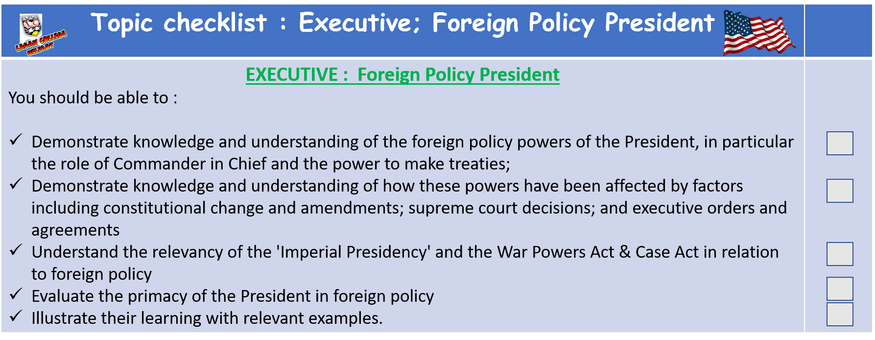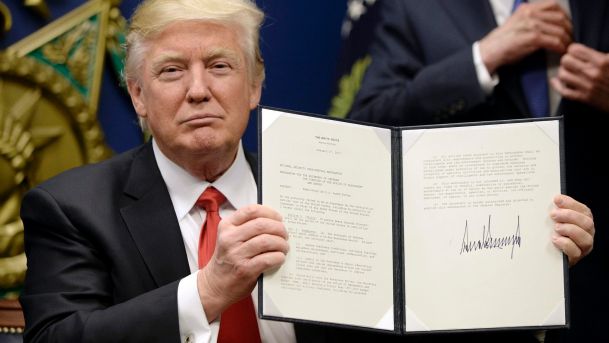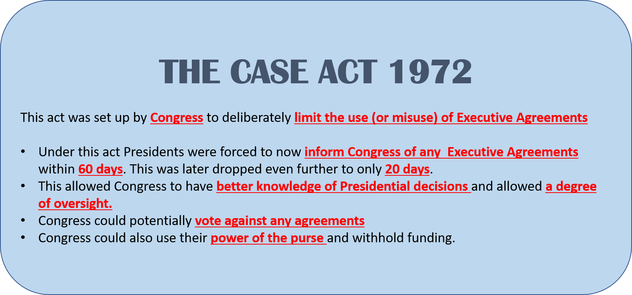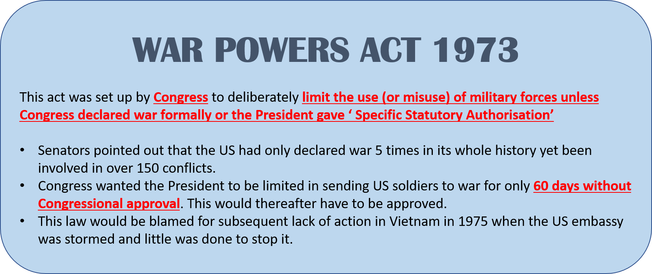The US Constitution is deliberately vague in matters of Foreign policy (especially compared to domestic policy)
The Founding Fathers could not possibly have envisaged the immense foreign policy role of the modern 21st century President but they did realise that too many restraints and overzealous checks and balances would undermine the position and therefore the country.
A President needed to make decisions quickly - especially in an emergency (having to refer matters to Congress - could affect national security in an emergency!) They had to work in smaller teams to achieve goals more effectively. The advent of possible nuclear war meant quick decisions would have to be called for.
Gridlock would serve nobody - only the enemies of the United States.
Therefore powers were deliberately overlapping and are set out in ARTICLE 2 of the Constitution. The formal powers are given below
The Founding Fathers could not possibly have envisaged the immense foreign policy role of the modern 21st century President but they did realise that too many restraints and overzealous checks and balances would undermine the position and therefore the country.
A President needed to make decisions quickly - especially in an emergency (having to refer matters to Congress - could affect national security in an emergency!) They had to work in smaller teams to achieve goals more effectively. The advent of possible nuclear war meant quick decisions would have to be called for.
Gridlock would serve nobody - only the enemies of the United States.
Therefore powers were deliberately overlapping and are set out in ARTICLE 2 of the Constitution. The formal powers are given below
|
|
|
1) COMMANDER IN CHIEF OF THE ARMED FORCES
|
This power has grown enormously not just since the 1770's but even the 1930's! In the 1930's Portugal had a larger army than the United States! - this was transformed massively by US involvement in the Second World War which saw it triumph and emerge as a Superpower - armed with nuclear weapons and ready to fight the Cold War. Therefore the role of Commander in chief has been one which has been elevated in status. Presidential power has saw the USA become involved in wars in Korea, Vietnam, Grenada, Kuwait and more recently in Iraq and Afghanistan. As has been demonstrated by history, Presidents can wade into these wars without a formal declaration of war. There are some limitations however - see limitations section.
|
|
2) APPOINTMENT POWERS IN RELATION TO FOREIGN AFFAIRS
Presidents also have well known and wide ranging appointment powers. Unlike the UK where many of the key positions in the diplomatic service are Civil service and therefore non political - the President has quite a lot more discretion on who they can appoint. This can include:
Many of these are political appointments. They can instruct their ambassadors on the course they would like them to take. There are of course some limitations to these appointments too.
- Ambassadors
- Foreign policy staff and envoys.
- Secretary of State
- Secretary of Defence
- Secretary for Homeland Defence
- National Security Advisor
- Head of CIA
Many of these are political appointments. They can instruct their ambassadors on the course they would like them to take. There are of course some limitations to these appointments too.
3) POWER TO NEGOTIATE TREATIES ON BEHALF OF THE NATION
|
The President is regarded as Chief diplomat speaking on behalf of the nation when negotiating treaties. These are in relation to peace, disarmament, trade or immigration. The President can also 'recognise' a country - for example Cuba by Obama- this opened up diplomatic relations for the first time in decades. There are of course limitations to the Presidents powers too.
The Founding Fathers recognised (perhaps due to their own protracted talks and negotiations) that making Treaties and compromises needed a smaller body of men. They wanted to give them the freedom to do this. The President is the figure who is given the key information - much of it secret, by bodies like the CIA and NSA, so should be in a position to make an informed decision. HOWEVER, the founding fathers also wanted the ability to investigate and scrutinise any treaty in the Senate. Treaties would therefore only be ratified with the Senates support (2/3rds) In recent years the President has got round this stipulation in the Constitution. They have instead made EXECUTIVE AGREEMENTS with other countries. These have the same legal standing as a full international Treaty and are regarded as part of their constitutional role as Commander in Chief. However, as they are not called a Treaty, they are not required to be ratified. This has caused a boom in Executive Agreements.
A Presidents statements can also indicate Foreign Policy - For example his recognition of Jerusalem as the capital of Israel has been a hugely controversial move. |
4) PRESIDENTS CAN SET THE TONE OF FOREIGN POLICY
Presidents can create policy by their actions or statements.
- President George W Bush used the reaction to 9/11 to deliver his drive to destroy the 'Axis of Evil'- a named group of countries that Bush regarded as hostile to US interests.
- President Truman aimed his policy in the 1940's to 'contain' the spread of communism. [Containment]
- Nixon wanted Peace With Honour in Vietnam - aiming to get the US out of the conflict in the least damaging way possible.
- Reagan called the USSR 'The Evil Empire' directly standing up to them and aiming to outgun them with his supposed 'Star Wars' programme.
- Obama - reached out the diplomatic hand to two old enemies of the USA - Iran and Cuba. He made a nuclear deal with Iran and he officially recognised Cuba as a state. He also aimed to close down Guantanamo bay Prison and withdraw US troops from Iraq.
- Trump aims to introduce a Travel ban on Muslims from 6 countries. ; He wants to build a physical border with Mexico - the so called Wall He aims to reduce American relations with Iran and put pressure on North Korea - including threatening nuclear attack. He wants to reduce American involvement in organisations like NATO. He has 'recognised' Jerusalem controversially as the state capital of Israel.
In 1973 following a Presidential crisis - (Watergate / Vietnam) Arthur Schlesinger released a book which would harshly criticise the growth and misuse of the powers of the Presidency since the Second World War. It was especially critical of how the Presidency was abusing its power through its secrecy and aiming to undermine Congressional powers set up to limit its activity.
Schlesinger suggested that the imperial presidency was in fact evolving increasingly rapidly since the 1930's. He suggests that the powers were assumed ever more closely by the President following the attack on Pearl Harbour in 1941. From that point on he argues, the Presidency was able to reduce some of the Congressional powers and influences which may have steadied previous Presidents. He suggests that Presidents have instead taken a number of other ways to create foreign policy and in some ways they have misused the secrecy needed for the role of President
Examples:
Schlesinger suggested that the imperial presidency was in fact evolving increasingly rapidly since the 1930's. He suggests that the powers were assumed ever more closely by the President following the attack on Pearl Harbour in 1941. From that point on he argues, the Presidency was able to reduce some of the Congressional powers and influences which may have steadied previous Presidents. He suggests that Presidents have instead taken a number of other ways to create foreign policy and in some ways they have misused the secrecy needed for the role of President
Examples:
- Cuba - The Bay of Pigs was a government sponsored unsuccessful invasion of Cuba (which went horribly wrong and ended in US humiliation for the US and Kennedy - who was following CIA advice) It was obviously not sanctioned by Congress.
- Vietnam war - boosted enormously by the Tonkin resolution - giving the US President almost a blank cheque to use all matters needed to win. Showed growing power of President over Congress. It was later discovered that US forces in Thailand had been secretly bombing another country bordering Vietnam called Laos since the early 1960's. They did this from bases in Thailand which stationed thousands of US military - all without the knowledge or approval of Congress. This had also happened in a bombing war over Cambodia another neighbouring country. This was only discovered in 1969 due to a special Senate foreign affairs committee called the Symington committee which uncovered the full extent of secret operations. This made it clear just how much power the Presidency was accumulating unhindered.
- Nixon administration - This administration above all signified an imperial Presidency. Nixon was an extremely strong President but also a controlling one and someone who undoubtedly abused the system for their own means. This was clear when it came to the Watergate scandal where the US Executive office was implicated in a plot to secretly spy on Democrat party offices misusing government funds and assets in the process of subverting democracy and committing crime.
The argument surrounding the Imperial Presidency was balanced by those who rejected such an outlook. They argued that the normal checks and balances had worked perfectly in holding the system to account. Some began to argue that in fact the imperial presidency was actually an imperilled presidency whereby the office was so curtailed that it could not function properly. This was given impetus by two weak presidencies of Ford and Carter in the second half of the 1970's
What evidence was there that the Presidency was not overly imperial?
What evidence was there that the Presidency was not overly imperial?
- Nixon had abused power - no one argued about that but he had resigned and was threatened with impeachment. Congressional committees (aided in large part by strong and impressive journalism) had actually exposed the Watergate scandal and forced the obvious solution. (Some may argue that Nixon should never have been pardoned)
- The Symington Committee had actually did its congressional job and exposed abuse of power in 1969. It exposed the Presidents misuse of secrecy and subterfuge in fighting the Vietnam war but the fact it managed to do so suggests the system worked.
1) LAWS:
Claims of Presidential dominance fuelled congressional calls to be much more effective and to increase its powers to hold a President to account in Foreign policy matters. They passed two laws to try and reassert control. You have to be aware of these laws:
Both of these were more symbolic than effective. They did little to hold the US Presidency to account in reality
- Secret wars still continued and were accepted as having to continue by politician and President alike
- Presidents aimed to complete any conflict within the 60 day limit - therefore many conflicts like the First Gulf war were short affairs
- Presidents continued with Executive agreements but just renamed them!
2) RATIFICATION OF TREATIES
As you should be aware international treaties signed by the President require ratification by the Senate.
Treaties have been rejected before (although this is unusual:
- The Senate Foreign Affairs committee will investigate the treaty signed by the President. They will then vote on the Treaty.
- The Senate committee vote is not binding. However, the result and findings of the Senate committee will be fed back to the Senate chamber. The Committee is highly respected and its judgement valued.
- Senators will vote on ratification
- The Ratification needs a 2/3rds supermajority.
Treaties have been rejected before (although this is unusual:
- Treaty of Versailles (1919)
- SALT 2 Treaty on Nuclear arms reductions.
3) CONFIRMATION OF APPOINTMENTS
The Senate also has the exclusive power of CONFIRMING Presidential appointments including Foreign policy nominees
- The Senate committee will hold hearings to question a nominee
- They will ask probing questions assessing the candidates credentials - much like a job interview.
- They will report back to the Senate their findings
- The Senate will take a vote - a Simple majority will confirm an appointee.
4) IMPEACHMENT
A President can of course always be impeached if they have been found to have acted unconstitutionally.
Having such a supermajority is of course very difficult to achieve. No President has been fully impeached although 2 have been accused - including Bill Clinton
Nixon should have been impeached over Watergate - however he resigned and was then pardoned for his actions over Watergate.
- The House will impeach (accuse) and vote on it
- It requires 2/3rds support
- The Senate will then try the President
- It will require 2/3rds support in the Senate to have the President successfully impeached and removed from office
Having such a supermajority is of course very difficult to achieve. No President has been fully impeached although 2 have been accused - including Bill Clinton
Nixon should have been impeached over Watergate - however he resigned and was then pardoned for his actions over Watergate.
5) CONGRESSIONAL POWER TO DECLARE WAR.
Congress retains the power to declare war against a foreign state.
This has to be passed by BOTH the House and the Senate.
The last time this happened was back in December 1941 following Pearl Harbour. There have been many more conflicts since then that the US has been involved in. A President can use Executive Agreements to work their way around this. They can also act in times of national crisis - building support for further 'emergency actions' as they fulfil their role as commander in chief. Presidents tend to court Congressional approval for any military actions on a large scale. It is essential Congress is on side due to what they provide
EXAMPLE:
This has to be passed by BOTH the House and the Senate.
The last time this happened was back in December 1941 following Pearl Harbour. There have been many more conflicts since then that the US has been involved in. A President can use Executive Agreements to work their way around this. They can also act in times of national crisis - building support for further 'emergency actions' as they fulfil their role as commander in chief. Presidents tend to court Congressional approval for any military actions on a large scale. It is essential Congress is on side due to what they provide
EXAMPLE:
- Attacks on Afghanistan following 9/11 were not carried out following a declaration of war - but they were supported by Congress anyway. President Bush could exploit the catastrophic situation following 9/11 to forge a direct and immediate response. He could 'wrap himself in the flag' using patriotism and national defiance to gain the immediate support of Congress for whatever actions were needed. In this way Bush was granted huge amounts of power and finance to wage his war on terror for years to come.
- Bush was also granted a new department - the Department for Homeland Security which would be responsible for protecting the United States. As part of this sweeping new counter terrorism laws were introduced termed the Patriot bill - this gave the US state the power to use increased surveillance and to hold suspects for longer without trial.
6) CONGRESSIONAL 'CONTROL OF THE PURSE'
Wars are notoriously expensive. One key weapon the House can wield is in the power of the purse. The War on terror is estimated to have cost the US over $1.2 trillion for example. Democrats tried to curtail the spiralling effects of the war in 2007 by aiming to curtail spending on it - when they managed to control both houses.
However, Congressional limitations were clearly demonstrated here when President Bush vetoed their proposals to cut spending. Despite their Democrat control of both the House and the Senate they did not have the 2/3rds majority needed to override Bush's veto.
However, Congressional limitations were clearly demonstrated here when President Bush vetoed their proposals to cut spending. Despite their Democrat control of both the House and the Senate they did not have the 2/3rds majority needed to override Bush's veto.
7) CONGRESSIONAL SCRUTINY - INVESTIGATIONS
Congressional Oversight is highly important in US Foreign policy. Committees have had a great influence in highlighting issues.
They can call witnesses in these hearings and can question them to ensure the effectiveness and at times the legality of Government actions
Examples:
They can call witnesses in these hearings and can question them to ensure the effectiveness and at times the legality of Government actions
Examples:
- Symington Committee (1969)- investigated claims (which were true) that the US were operating 7 bomber bases inside Thailand for their bombing of 2 countries - Laos and Cambodia. Laos in fact became the most bombed country in the world - yet the US Congress knew nothing about these missions until the Committee highlighted it.
- Congressional investigations into Iraq war (2007) Congressional committees held hearings where they interviewed the key commanders in the war in Iraq aiming to estimate its effectiveness.
- Iran Contra affair - In the 1980's the Iran Contra affair tarnished Reagans reputation. Colonel Oliver North was interviewed by the Committee investigating the scandal.









